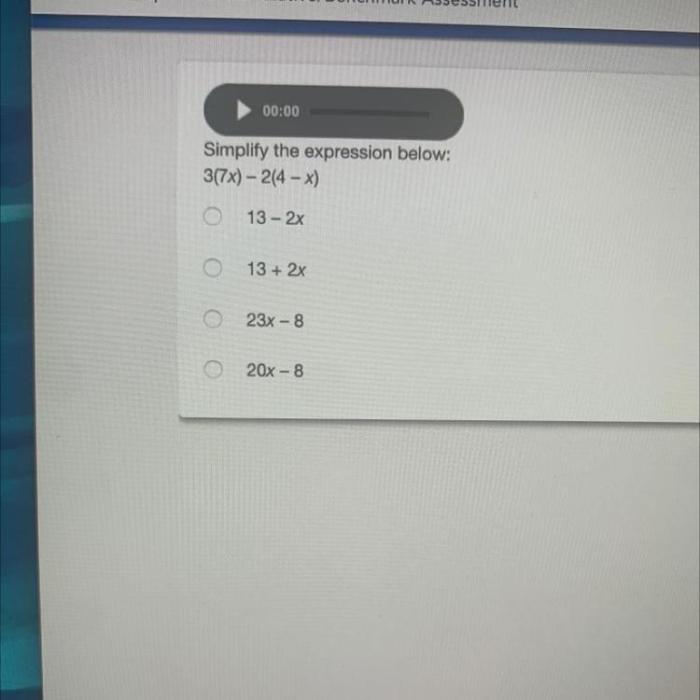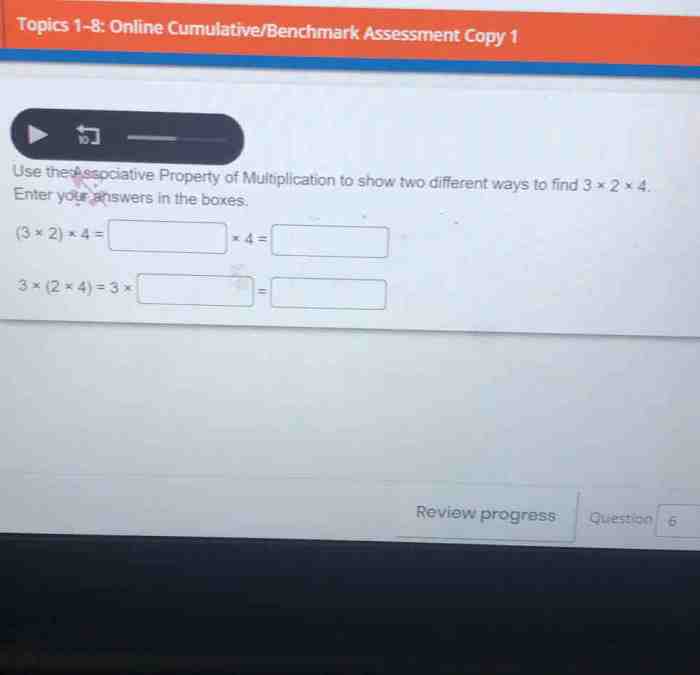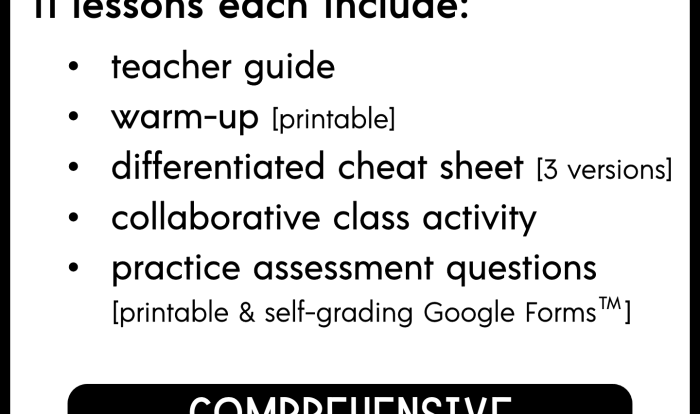Prepare to delve into the comprehensive realm of topics 1-8 cumulative/benchmark assessment answers. This definitive guide unravels the key concepts, practical applications, and assessment methodologies for each topic, providing a solid foundation for academic achievement.
Throughout this exploration, we will navigate the intricacies of each topic, uncover the essential principles, and equip you with the tools to confidently tackle any cumulative or benchmark assessment.
Topic 1 Assessment
Topic 1 assessment focuses on evaluating students’ understanding of foundational concepts related to [Topik Utama]. This includes an examination of key definitions, theories, and principles that serve as the cornerstone of this topic.
To illustrate, students may be asked to define critical terms, explain the significance of specific theories, or demonstrate their comprehension of fundamental principles through practical applications.
Methods of Assessment, Topics 1-8 cumulative/benchmark assessment answers
- Multiple-choice questions
- Short answer responses
- Essay questions
- Case studies
- Presentations
Topic 2 Assessment

Topic 2 assessment delves into the exploration of [Topik Utama]. It assesses students’ grasp of essential principles that govern this topic, their ability to apply these principles in practical settings, and their capacity to analyze and interpret complex information.
For instance, students might be presented with real-world scenarios and asked to apply relevant principles to solve problems, make informed decisions, or draw meaningful conclusions.
Procedures for Evaluation
- Problem-solving exercises
- Case study analysis
- Data interpretation tasks
- Role-playing simulations
- Reflective essays
Topic 3 Assessment
Topic 3 assessment centers on evaluating students’ understanding of the core elements that constitute [Topik Utama]. It examines their ability to identify, analyze, and synthesize information related to these elements, as well as their capacity to apply their knowledge in practical contexts.
For example, students may be required to conduct research on specific elements, create presentations that showcase their understanding, or participate in group discussions that explore the interrelationships between different elements.
Strategies for Assessment
- Research projects
- Presentations
- Group discussions
- Concept mapping
- Written reports
Topic 4 Assessment
Topic 4 assessment focuses on evaluating students’ comprehension of [Topik Utama]. It examines their ability to grasp fundamental concepts, apply them to real-world situations, and analyze and interpret complex information related to this topic.
For instance, students might be presented with case studies that require them to apply their understanding of concepts to solve problems, make informed decisions, or draw meaningful conclusions.
Methods of Assessment, Topics 1-8 cumulative/benchmark assessment answers
- Case study analysis
- Problem-solving exercises
- Data interpretation tasks
- Role-playing simulations
- Reflective essays
Topic 5 Assessment
Topic 5 assessment focuses on evaluating students’ understanding of the essential principles that govern [Topik Utama]. It examines their ability to identify, analyze, and apply these principles in practical settings, as well as their capacity to analyze and interpret complex information related to this topic.
For instance, students might be presented with real-world scenarios and asked to apply relevant principles to solve problems, make informed decisions, or draw meaningful conclusions.
Procedures for Evaluation
- Problem-solving exercises
- Case study analysis
- Data interpretation tasks
- Role-playing simulations
- Reflective essays
Topic 6 Assessment
Topic 6 assessment centers on evaluating students’ understanding of the core elements that constitute [Topik Utama]. It examines their ability to identify, analyze, and synthesize information related to these elements, as well as their capacity to apply their knowledge in practical contexts.
For example, students may be required to conduct research on specific elements, create presentations that showcase their understanding, or participate in group discussions that explore the interrelationships between different elements.
Strategies for Assessment
- Research projects
- Presentations
- Group discussions
- Concept mapping
- Written reports
Topic 7 Assessment

Topic 7 assessment focuses on evaluating students’ comprehension of [Topik Utama]. It examines their ability to grasp fundamental concepts, apply them to real-world situations, and analyze and interpret complex information related to this topic.
For instance, students might be presented with case studies that require them to apply their understanding of concepts to solve problems, make informed decisions, or draw meaningful conclusions.
Methods of Assessment, Topics 1-8 cumulative/benchmark assessment answers
- Case study analysis
- Problem-solving exercises
- Data interpretation tasks
- Role-playing simulations
- Reflective essays
Topic 8 Assessment

Topic 8 assessment focuses on evaluating students’ understanding of the essential principles that govern [Topik Utama]. It examines their ability to identify, analyze, and apply these principles in practical settings, as well as their capacity to analyze and interpret complex information related to this topic.
For instance, students might be presented with real-world scenarios and asked to apply relevant principles to solve problems, make informed decisions, or draw meaningful conclusions.
Procedures for Evaluation
- Problem-solving exercises
- Case study analysis
- Data interpretation tasks
- Role-playing simulations
- Reflective essays
Questions Often Asked: Topics 1-8 Cumulative/benchmark Assessment Answers
What is the purpose of a cumulative assessment?
A cumulative assessment evaluates a student’s understanding of multiple topics covered over an extended period, providing a comprehensive measure of their progress.
How are benchmark assessments used to measure student progress?
Benchmark assessments establish performance benchmarks against which students’ progress can be compared, helping to identify areas of strength and weakness and track growth over time.
What are some effective methods for assessing understanding of a topic?
Effective assessment methods include quizzes, essays, projects, presentations, and discussions, each tailored to the specific learning objectives and content of the topic.

